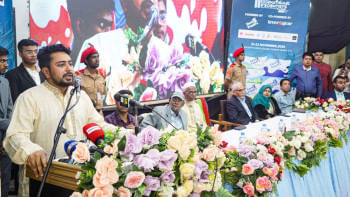A Titan in our shared history
As I sit at the computer in a bright room washed with sunlight to write this piece, I feel a dark cloak over my heart, as though in some strange way a part of me has passed away in some other faraway land. I have been an ardent admirer of the life and works of Singapore's founding father Lee Kuan Yew and with his sad demise I believe there have been very few people left in the world for me to look up to. This is a piece I never thought I would have to write.
Born 91 years ago as Harry Lee Kuan Yew to a fourth generation Chinese immigrant family, Yew has been a witness to the rough and tumbles of modern history. His foray into politics took place 64 years ago at the Victoria Memorial Hall, Singapore when People's Action Party (PAP) was formed. And there was no turning back after that.
The most heartbreakingly painful episode in Yew's life is perhaps Singapore's expulsion from Malaysia in 1965. Yew tried his best to reason with Malaysian Prime Minister Tunku Abdul Rahman, thinking that the tiny island-nation will not survive with the help of the central government.
Expelled from Malaysia, Yew broke into tears at the presser where he said, ""Every time we look back on this moment when we signed this agreement which severed Singapore from Malaysia, it will be a moment of anguish. For me it is a moment of anguish because all my life ... you see, the whole of my adult life ... I have believed in merger and the unity of these two territories. You know that we, as a people are connected by geography, economics, by ties of kinship..." He was never seen crying in public after that.
From scratch, he has been instrumental in turning a sleepy fishing village into the vibrant melting pot of cultures that we now know as Singapore. The recipe to the country's success lies in the creation of a meritocratic society based on justice and rule of law. Singapore is what Lee Kuan Yew has been: pragmatic, innovative, incorruptible and forward looking.
It is indeed Yew who has been the lone architect behind the magical development of the city state. His pragmatism can be seen in the way Singapore's military defence system works. After it became independent, Yew told his Defence Minister to write letter to Lal Bahadur Shastri, the prime minister of India, and President Gamal Abdel Nasser of Egypt seeking urgent help. When both the leaders were reluctant to militarily help Singapore, he resorted to Israel to build Singapore's defence.
Five months after the country got independence, six members of Israel Defence Force (IDF) arrived at the city-state to help Singapore develop its army. Yew tried his best not to earn the wrath of Singapore's two big Muslim neighbours; so the presence of IDF members on the island was kept a secret and they were called the Mexicans to disguise their presence. Yew says in From Third World to First: The Singapore Story 1965-2000, "They looked swarthy enough."
The Singapore Army is now one of the most well-equipped and efficient forces in the world. Modelled after the IDF, Singapore Defence Forces heavily rely on conscriptions and every able-bodied 18-year old is required to spend a term of two months in the IDF.
Defence is only one part of Yew's success stories. Singapore boasts of a hyper-efficient government and a country where 90 percent of the population lives in the property they own. Singaporean students are some of the top achievers in the world and the country's higher education system is considered to be the best in the region. His son and Singapore's Prime Minister Lee Hsien Loong is right in saying, "We won't see another man like him. To many Singaporeans, and indeed others too, Lee Kuan Yew was Singapore."
In fact, under Yew the state almost became a father figure that would look after its children. His government was famous for even doing some matchmaking so that the country's brightest men and women marry each other and produce intelligent babies.
I lived in Singapore for a long time and many a time while having laksa at Qiji or jogging somewhere in the Tampines, I wondered what Yew had got in return. The answer came in a book where Lee Kuan Yew says, "At the end of the day, what have I got? A successful Singapore. What have I given up? My life." There aren't many politicians left in this world who will be able to say this with pride and honesty.
Harry, you will be sorely missed.
The writer is Editor of The New Anthem: the Sub-continent in its Own Words (Tranquebar; Delhi; 2009). He can be contacted
at: ahmedehussain@gmail.com. Twitter: @ahmedehussain


 For all latest news, follow The Daily Star's Google News channel.
For all latest news, follow The Daily Star's Google News channel. 



Comments